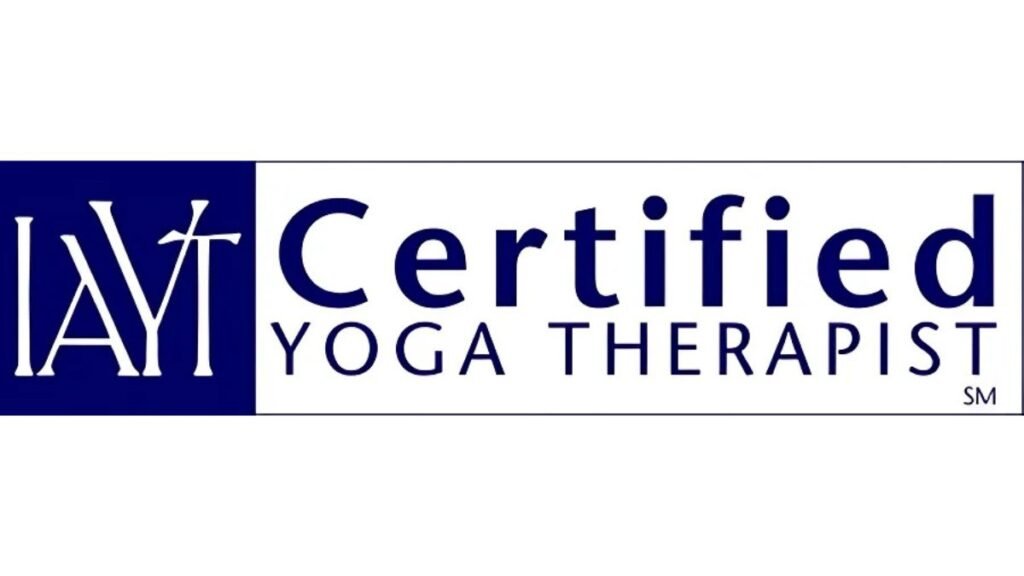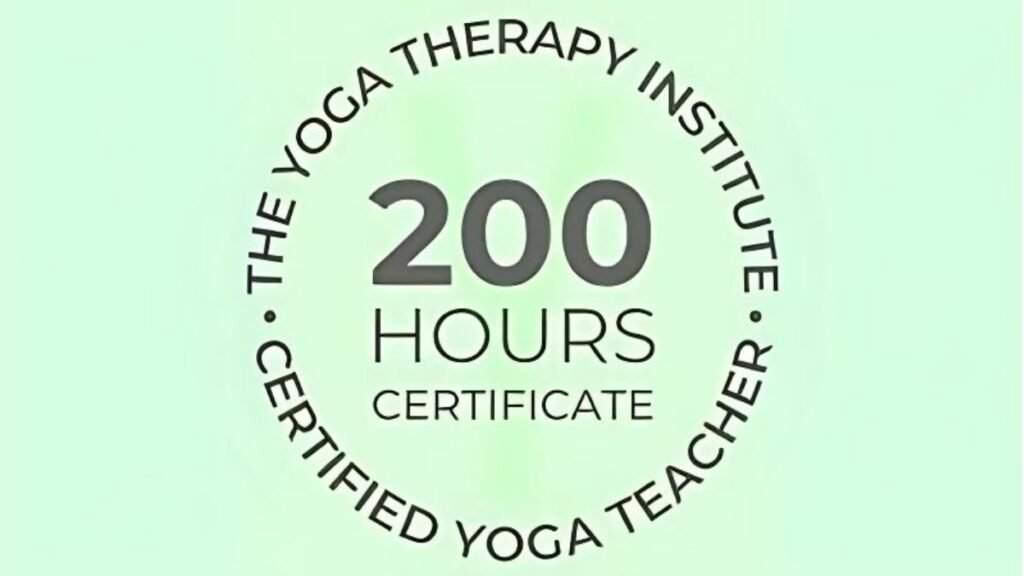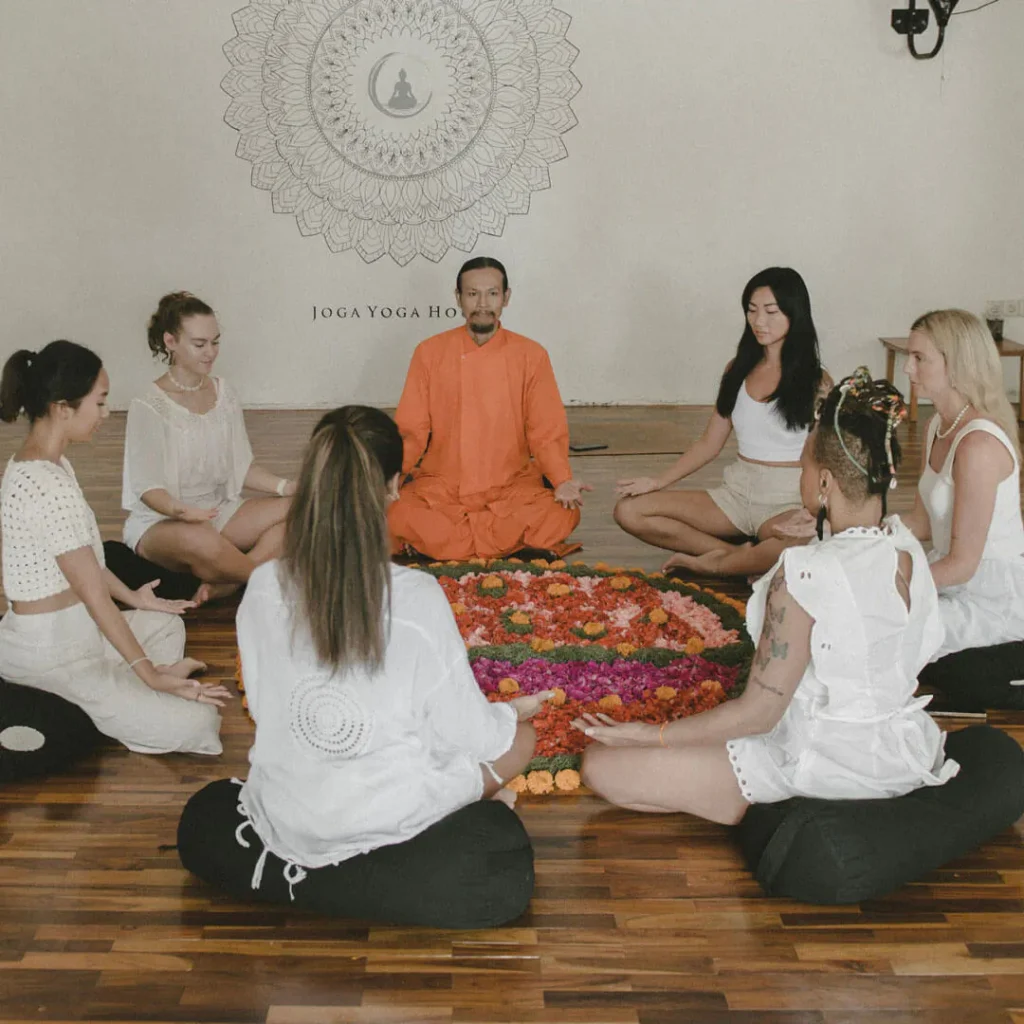Yoga therapy is one of the fastest-growing intersections of holistic healing and modern health care. But with its rising popularity comes plenty of confusion—what exactly is yoga therapy? Do you need a degree to practice it? And how does it differ from traditional talk therapy or physical therapy?
Whether you’re a yoga teacher looking to deepen your offerings, or a wellness seeker interested in a more personalized path, this guide covers everything you need to know about pursuing a yoga therapy degree or certification.

What Is Yoga Therapy?
Yoga therapy is a complementary healing modality that adapts yoga practices to support specific physical and mental health conditions.
Unlike general yoga classes that focus on group instruction and general wellness, yoga therapy is highly individualized.
At its core, yoga therapy empowers clients to take an active role in their own healing. It’s used to support a range of issues from chronic pain, arthritis, and injuries, to mental health challenges like anxiety, depression, and trauma.
Yet, many still confuse yoga therapy with mental health therapy. This concern surfaced frequently in community forums like Reddit, where licensed therapists voiced ethical concerns about using the word “therapy” outside of clinical licensing. The key distinction: yoga therapy supports healing but does not diagnose or prescribe clinical treatment. It’s an adjunct, not a replacement, for traditional medicine.
Yoga Therapy vs. Other Modalities – What’s the Difference?
One of the biggest misconceptions about yoga therapy is that it’s just physical therapy in yoga pants—or that it’s an unlicensed form of psychotherapy. In truth, it shares aspects of both, but it’s neither.
Yoga Therapy vs. Physical Therapy
While both may support injury recovery or mobility, physical therapy is a medical profession. Yoga therapy does not involve medical diagnosis, insurance billing, or clinical supervision. It focuses instead on body awareness, breath regulation, and mindfulness techniques to support healing.
Yoga Therapy vs. Somatic & Polyvagal Therapies
Many yoga therapists draw inspiration from trauma-sensitive practices like polyvagal theory or somatic experiencing. However, yoga therapy typically uses asana and pranayama as the primary tools, rather than verbal or body-led processing techniques. There’s overlap in nervous system regulation, but the approach is rooted in yogic tradition.
Yoga Therapy vs. Talk Therapy (LCSW, LMFT, etc.)
Yoga therapists are not licensed mental health counselors. They do not conduct diagnoses, crisis intervention, or psychotherapy. Instead, they may support emotional regulation, resilience, and awareness using non-verbal practices.
Reddit discussions highlight these blurred boundaries. Some licensed professionals argue that labeling it “therapy” creates confusion, especially when emotional or psychological benefits are emphasized. It’s important that schools and practitioners clearly define scope and set boundaries, which many IAYT-accredited programs now emphasize in training.
Do You Need a Degree to Become a Yoga Therapist?
Short answer: no, but you do need a specialized certification.
Yoga therapy is not yet a legally regulated profession in most countries, meaning there is no government-mandated degree like those for psychologists or physicians. However, the International Association of Yoga Therapists (IAYT) has established rigorous standards for certification that most credible programs follow.
Certifications vs. Degrees
Yoga therapy credentials are certifications, not academic degrees. You don’t need a college diploma to enter training, but most programs require you to have a 200-hour yoga teacher certification first. From there, training can range from 300 to 800 hours.
Reddit threads reveal ethical tensions around the scope of practice. For example, some users expressed concern about “unqualified” individuals offering therapeutic services without clinical education. The key is transparency—ethical yoga therapists do not present themselves as doctors or therapists, but as complementary wellness practitioners.
Can Yoga Therapists Diagnose or Prescribe?
No. Yoga therapists are trained to work with people with pre-existing diagnoses, not to provide one. Their job is to adapt yoga tools to the client’s goals and condition, often in partnership with other healthcare providers.
Types of Yoga Therapy Programs Available
If you’re considering becoming a certified yoga therapist, it’s essential to understand the types of training programs available and what sets them apart.
200-Hour vs. 500-Hour Foundations
Most yoga therapy programs require a minimum 200-hour yoga teacher training (YTT) as a prerequisite. However, the actual yoga therapy certification typically involves a minimum of 800 hours of specialized instruction beyond the foundational level. Some programs offer this in 500-hour formats built on top of a YTT background.
Accredited Yoga Therapy Schools (IAYT-Recognized)
The International Association of Yoga Therapists (IAYT) is the leading global credentialing body. Programs accredited by IAYT meet specific standards in yoga philosophy, clinical application, and ethics. Attending an IAYT-approved school ensures your certification will be recognized by employers and insurance bodies.
Notable IAYT-recognized schools include:
- Kripalu School of Integrative Yoga Therapy
- Breathing Deeply Yoga Therapy
- Phoenix Rising Yoga Therapy
Online vs. In-Person Programs
Many programs now offer hybrid or fully online formats, making yoga therapy training more accessible. This flexibility is especially important for those juggling jobs, families, or geographical limitations.
Still, Reddit threads reveal some students feeling priced out or culturally disconnected from yoga therapy programs. Concerns around elitism, high tuition, and limited representation in faculty are real. For those seeking accessible, inclusive training, programs like Joga Yoga emphasize affordability and community-focused education rooted in yogic integrity.
What You’ll Learn in a Yoga Therapy Program
Yoga therapy training goes far beyond traditional yoga teacher instruction. It integrates science, psychology, and ancient wisdom into a comprehensive healing system.
Anatomy, Pathology, and Chronic Conditions
Students dive deep into functional anatomy, common pathologies (like arthritis, diabetes, scoliosis), and how to create practices that accommodate injuries, aging, and chronic conditions.
Trauma-Informed Care
Modern programs include trauma-sensitive practices and guidance on creating safe, regulated spaces. This is crucial for working with populations impacted by PTSD, anxiety, or chronic stress, though, as emphasized on Reddit, yoga therapists must remain clear they are not providing mental health diagnosis or therapy.
Yoga Philosophy and Mind-Body Practices
You’ll explore texts like the Yoga Sutras, Ayurveda principles, and the energetic models of the koshas and chakras—connecting ancient insights to modern clinical frameworks.
Clinical Application: Assessment + Case Study Work
Trainees learn to conduct intake assessments, track progress, and build individualized practices. Programs often include supervised practicum hours, where students apply their knowledge in real-world settings.
Is Yoga Therapy a Legitimate Career?
The short answer is yes, but it depends on how you define legitimacy and what kind of settings you plan to work in.
Who Hires Yoga Therapists?
Yoga therapists work in a variety of settings:
- Hospitals and integrative care centers
- Rehabilitation clinics and wellness spas
- Private practice, either solo or in group settings
- Corporate wellness, elder care, and nonprofit programs
Some may collaborate with doctors, psychotherapists, or chiropractors, but typically function as complementary wellness providers.
Can You Get Insured or Licensed?
Yoga therapists are not licensed in the same way as psychologists or physicians. However, professional liability insurance is available through organizations like IAYT, and more employers are recognizing certified yoga therapy credentials in hiring.
Reddit comments highlight the gray zone of legitimacy—some feel the field lacks credibility due to inconsistent regulation, while others view it as a powerful bridge between Western medicine and holistic healing. The credibility of your training (IAYT-recognized), your scope clarity, and ethical integrity make the biggest difference.
Career Outcomes After Certification
One of the most frequently asked questions about a yoga therapy degree is: what happens after graduation? The truth is, yoga therapy offers a versatile, evolving career path, especially as more healthcare systems and wellness providers integrate mind-body approaches.
Generalist vs. Specialization Routes
Some yoga therapists choose to be general practitioners, serving a wide range of populations from seniors to stress-affected professionals. Others specialize in areas such as:
- PTSD and trauma recovery
- Chronic pain management
- Pelvic floor dysfunction
- Women’s health or perinatal care
These niches often reflect both personal experience and specific training modules.
Working with Specific Conditions
Certified yoga therapists are trained to adapt practices for people dealing with:
- Anxiety and depression
- Arthritis and back pain
- Cardiovascular conditions
- Neurological disorders (e.g., Parkinson’s, MS)
While they do not diagnose or treat medically, they work alongside healthcare teams or clients’ existing care plans.
Building a Private Practice or Joining Clinical Teams
Some therapists build independent practices, offering 1-on-1 sessions or therapeutic yoga groups. Others work in:
- Hospitals and integrative clinics
- Mental health settings (as adjunct support)
- Physical therapy or chiropractic offices
- Veterans’ programs or community health nonprofits
Reddit discussions stress that success depends on both clinical competence and business skills—a good training program should help with both.
Accreditation and Certification Bodies
Because yoga therapy is not currently regulated as a licensed medical profession, accreditation and credentialing play a vital role in maintaining standards and ensuring trust.
Overview of IAYT and Its Global Role
The International Association of Yoga Therapists (IAYT) is the primary credentialing and advocacy organization for the field. It defines educational standards, publishes research, and connects certified practitioners worldwide.
C-IAYT Credential and CEU Requirements
To become a Certified Yoga Therapist (C-IAYT), you must:
- Complete an IAYT-accredited program
- Submit documented practicum hours and case studies
- Adhere to a code of ethics
- Complete 24 CEUs (continuing education units) every 3 years
This credential is essential for professional recognition and liability insurance.

Other Credible Certifying Organizations
While IAYT is the gold standard, other organizations like Yoga Alliance or YogaFit offer therapeutic-style programs. However, these may not meet IAYT’s clinical depth or be recognized by hospitals or insurance companies.
If legitimacy and medical integration matter to your career goals, IAYT should be the benchmark.
Questions to Ask Before Choosing a Program
Choosing the right yoga therapy training can be overwhelming. Here’s a checklist of critical questions to guide your decision:
Is the School IAYT-Accredited?
This ensures the program meets professional standards and will prepare you for C-IAYT certification.
What Is the Student-to-Teacher Ratio?
Smaller cohorts often mean more personalized feedback, mentorship, and supervised practicum support.
Are There Mentorships or Clinical Placements?
Hands-on experience is vital. Look for programs that include real-life casework, clinical simulations, or partnerships with healthcare providers.
Is the Curriculum Trauma-Informed and Inclusive?
Reddit insights show many students value programs that center trauma sensitivity, cultural awareness, and accessibility. Ask if the faculty reflect diverse backgrounds and if the content goes beyond traditional asana models.
Criticisms and Misconceptions of Yoga Therapy
Yoga therapy is growing fast, but not without controversy. Many misconceptions stem from blurred lines between yogic healing and clinical psychology, along with accessibility and representation concerns.
Mislabeling vs. Therapeutic Legitimacy
Some critics—especially from licensed therapy fields—argue that calling it “therapy” is misleading. Yoga therapists do not diagnose or replace psychologists, but instead use yogic methods to support well-being and complement existing care plans.
Whitewashing and Exclusivity in Some Institutions
Reddit discussions reveal concern about schools gatekeeping through elitist language, rejection of lived experience, or favoring Westernized credentials. There’s an ongoing call for more inclusive, trauma-informed, and culturally grounded education.
Ethical Tensions with the Word “Therapy”
While “yoga therapy” conveys purpose, it also triggers debate around scope of practice. This isn’t mental health therapy, and ethical training should make that boundary crystal clear.
Reddit Insight: Boundaries, Access, and Mixed Opinions
Reddit users raised important points:
- Yoga therapy can empower healing, but must not claim to replace medical professionals.
- Some feel excluded from training despite being ideal candidates based on life experience.
- The title “therapist” creates confusion about what legal or clinical authority yoga therapists have.
These insights reflect why transparency and humility are essential in the yoga therapy space.

How to Get Started
Thinking about becoming a yoga therapist? Here’s the step-by-step breakdown:
Prerequisites: Do You Need to Be a Yoga Teacher First?
In most programs, yes. A 200-hour yoga teacher certification is typically required before entering a yoga therapy track. It ensures a foundation in asana, breathwork, and student safety.
Ideal Background: Anatomy, Psychology, or Health Coaching
While not mandatory, having experience in healthcare, psychology, coaching, or somatics can enhance your ability to absorb the material and relate to clients with complex needs.
Steps to Become a Yoga Therapist
- Complete a 200-hour YTT
- Enroll in IAYT-accredited program
- Log practicum hours
- Pass assessments & submit case studies
- Earn C-IAYT credential
Explore Programs That Support Holistic Learning
If you’re starting from the beginning, a solid 200-hour program is your first step.
At Joga Yoga, the 200-Hour Yoga Teacher Training in Bali lays the groundwork for embodied teaching and therapeutic depth. With a curriculum that blends:
- Journaling and self-inquiry
- Pranayama and somatic practices
- Yoga philosophy and nervous system support
…this program supports the inner work needed before serving others through yoga therapy. Learn more about the training’s immersive, inclusive approach in Mastering Yoga Teaching with Joga Yoga.

FAQs About Yoga Therapy Degrees
Here are the most common questions people have about pursuing this path:
Can I Become a Yoga Therapist Online?
Yes, many IAYT-accredited programs offer hybrid or fully online formats—especially post-2020. However, in-person practicum hours or clinical assessments may still be required.
Is Yoga Therapy Covered by Insurance?
In most countries, no, unless you’re also a licensed medical provider. However, some clients may use health savings accounts (HSAs) or find programs that integrate with allied healthcare.
How Long Does It Take to Complete Training?
Most yoga therapy programs span 2 to 4 years, including:
- 800–1000+ hours of coursework and practicum
- Case study evaluations
- Clinical mentorship
Can I Work with Trauma Patients?
Only with specialized trauma-informed training. Working with PTSD or complex trauma requires not just yoga tools, but an understanding of nervous system regulation, boundaries, and scope of practice.






